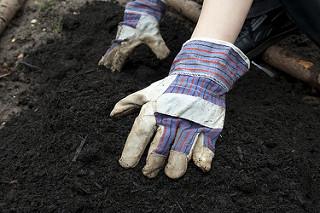Ву Marge Gianelli, El Paso Master Gardener
Unless you live in a few choice areas in El Paso, you probably have light-colored, coarse, grainy soil. Water has a tendency to drain right through, leaving plants dry without access to water in the hot afternoon summer hours. In addition, your soil probably contains few nutrients to promote root growth and development. Another complicating factor is the alkalinity of the soil. Typically, in El Paso the soil pH is around 8. With some exceptions, a pH of 6.0 to 7.0 is ideal for plant growth. What is a gardener to do?
Many homeowners have adapted by planting native plants accustomed to growing conditions in this area. If you wish to do this and not worry about improving your soil, you can find out about these plants at your local nurseries and demonstration gardens, on this website, or call our local Extension Office (915-771-2354) and ask to speak to a Master Gardener. But if you want a vegetable garden or a wider variety of plants, you would do well to get your soil tested. The results will not only tell you the composition of your soil, but also recommend treatment. More information on soil testing and soil sample testing kits are available at the Extension Office.
The El Paso gardener with soil like that described above will need to change the structure by adding amendments and fertilizing appropriately. This process will take time and persistence. Organic material will have to be added consistently over the years. With time, the soil will darken, and its water holding capacity will increase. Microorganisms will begin to multiply, thus providing nutrients to your garden plants.
Organic material dug into the soil and/or used as mulch on top of the soil conserves moisture, prevents erosion, soil compaction and crusting; feeds plants; and promotes earth worms, microbes, and other beneficial soil life by composting at the moist earth surface. Weeds are also reduced by effective mulching. Native mulch materials in our area include tree trimmings, grass clippings spread thinly and allowed to dry, compost, straw, and pine needles. A compost pile will provide a place for you to toss clippings and leaves; it also will provide you with a supply of a rich organic amendment.
Adjustments can be made in pH values by adding amendments to the soil. Acidifying materials can be carefully added. These include elemental sulfur or aluminum sulfate. Sandy soils require more frequent applications and lower amounts of nitrogen. Make sure adequate moisture is present after applying fertilizers high in salts. However, it is possible that your efforts to reduce the pH may be in vain due to the calcium carbonate levels in the water. In this case, one last option for the vegetable gardener is the raised bed. Construct a rectangle box open in the middle-sides only. Fill the box with top soil purchased at your nursery, organic material and compost. Plant your garden. Then mix in slow-release fertilizer that will provide continuous access to nutrients. Mulch around your plants, not too close to the stems, and water judiciously.
